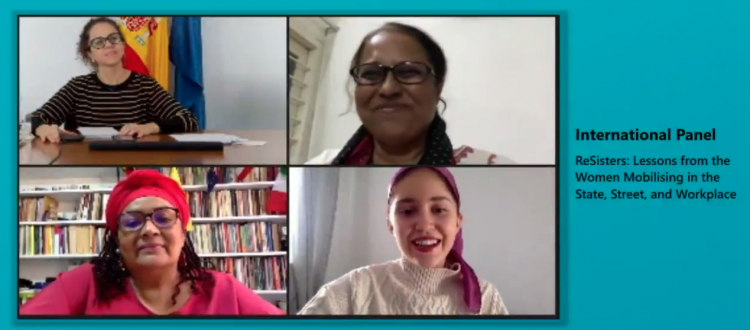Inspiring stories from our international sisters
In the current global context of war and Covid, widening inequality, rapidly increasing far-right power and attacks on our rights as workers and women - it can often feel like all we get is more bad news.
But there are also reasons to feel proud. In Spain, trade unions are mobilising and engaging with the progressive coalition government to enact labour reforms that target insecure work and wide-ranging policies that address gender-based violence (GBV). Throughout Poland, against a near ban on abortion brought in by the far-right government, women are striking once again. In Colombia, despite the ongoing murder of social leaders and brutal repression from the far-right government during recent strikes and protests, trade unionists and community organisations have worked alongside women's rights activists and those defending the peace process to form the Popular Women’s Platform calling for human and workers’ rights, peace and social justice. And SEWA, one of the biggest all-women trade unions in the world, continues to win rights for its 1.5 million members, supporting them to securing work. In March, we came together online to honour the successes of our sisters.
Bárbara Tardón, adviser to the Spanish Minister of Equality:
“As the Spanish Minister Irene Montero has stated, the feminist political moment is an ongoing project that improves our country and democracy. The threat against our policies from the extreme right is real. Despite this, we are proud of the developments over the past two years. We have enacted policies that protect rights for workers who are victims of GBV, worked to prevent it both in and out of the workplace, guaranteed the human right to recovery from GBV and, most importantly, allocated realistic funds for this work.”
Recent policies from the Spanish Ministry for Equalities:
-
Easier geographic mobility, suspension of labour contracts, and rights to work remotely, for survivors of GBV.
-
Rights for workers who are survivors including benefits, social security and rights on labour insertion. Training for all women, with incentives, to begin different employment if work is affected by violence.
-
A benefit payment for all survivors to support with time off work
-
Three investments totalling €66 million over the next three years so each region will have a crisis centre to respond to GBV, including the invisible violence often hidden in the workplace.
Nadia Oleszczuk, Polish activist and trade unionist
“Poland’s Consultative Council is our only NGO connecting trade unions, activists, employment rights experts and employees. Women do most of the lowest paid jobs in Poland, those in caring, education, cleaning, and low-paid admin work. Overburdening with household duties is the main barrier to professional work women face.”
“In January 2020, people living in Poland lost the right to terminate pregnancy even in the case of severe damage to a foetus. Girls and grandmothers joined together in peaceful protest to reclaim their rights. The people had many concerns: the incompetence of authorities managing the pandemic, ineffective protection of the rights of workers, and social inequalities when accessing safe medical services.”
The demands of the women's strike include:
-
Access to legal and free abortion for all people in need.
-
Recognition of the social and economic value of care work and reduction of working time
-
Ban on unfair contracts and rising social inequality
-
The right to strike
Victoria Sandino, Colombian senator and signatory of the peace agreement
“With the signing of the peace agreement, we began our work incorporating voices of women within it, including a gender perspective on its implementation. Women have been present from the beginning: rural peasant women, ethnic, indigenous, black women, students, young women, and feminists.”
“We have come together in a national platform with the aim of being able to include the struggles of all women. This is a very broad, inclusive coalition. We are fighting patriarchy, racism, capitalism, fascism, in defence of our territory, for peace with social justice, with the objective of a dignified life for women.”
Current motions in congress supported by the platform:
-
Measures to increase employment for young women
-
Access to health care for residents of the rural countryside
-
Political reform to increase participation and representation for women in decision making spaces
-
Increased autonomy for people living with disabilities and their caretakers (also often women)
Manali Shah, National Secretary, Self-Employed Women’s Association (SEWA)
“In India, 2.5 per cent of a city's population are street vendors, the majority often women. They provide fresh foods by congregating in one place: a natural market. Vendors are often fined, and natural markets are not incorporated into city planning. This denies women the right to life and livelihood - a fundamental right in our Constitution.”
“In 2014, SEWA supported a claim won by women street vendors in the Supreme Court to establish the right to vend. This was the first case of its kind, establishing a right to public space, that harassment of women by police and other authorities should desist, and the confiscation of perishable items should stop.”
SEWA has since worked to:
-
Create licenses and ID cards
-
Convinced the Ministry of Labour and Employment to consider street vendors as self-employed workers
-
Provide social security
Watch the panel in full here.
Stay Updated
Want to hear about our latest news and blogs?
Sign up now to get it straight to your inbox

